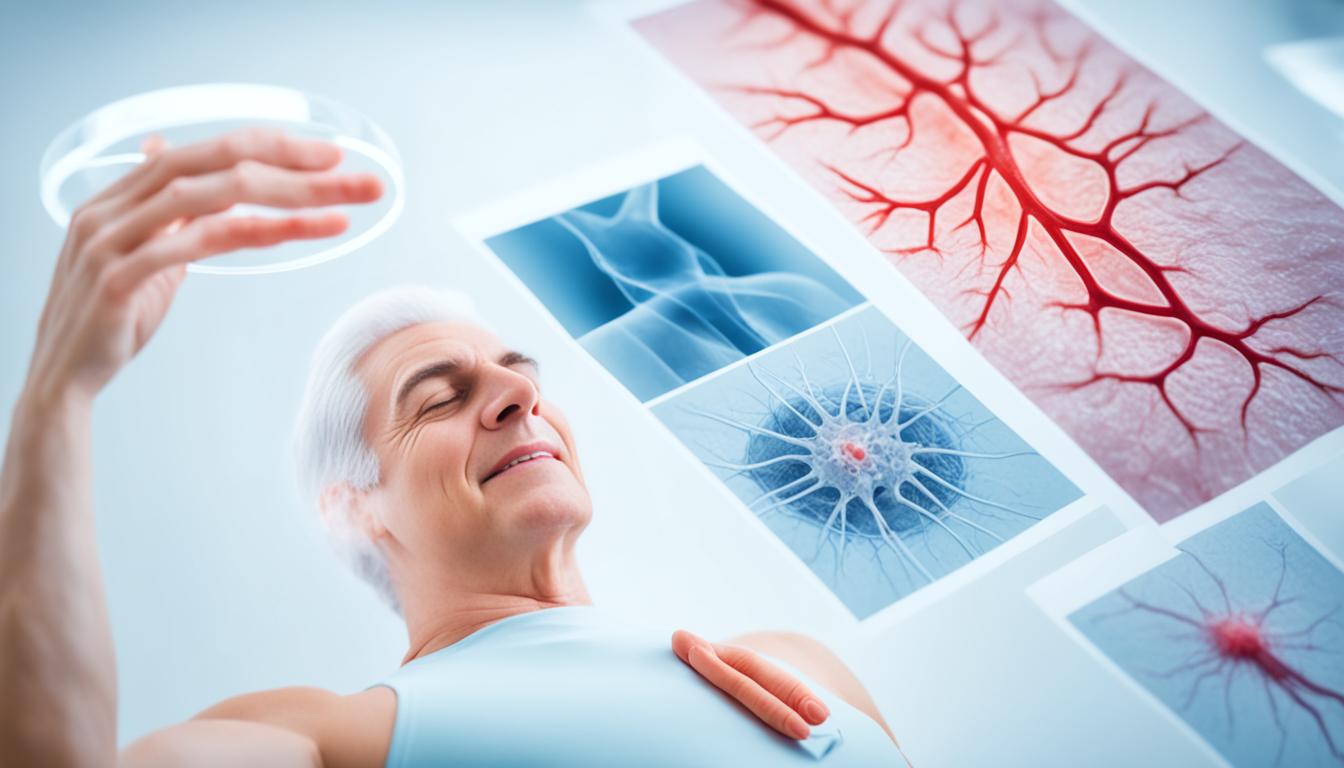Hyperhidrosis means excessive sweating. It happens even when the body’s not trying to cool down. For those with this condition, daily life can be hard. It can come from many causes, like medical issues or certain drugs. Primary hyperhidrosis is common and has no clear reason. Secondary hyperhidrosis comes from things like other health issues or drugs.
People with hyperhidrosis might sweat a lot on their hands, underarms, face, or feet. This can be tough on someone’s confidence and disrupt their day. Luckily, there are many ways to help manage it. This can include simple steps like stronger antiperspirants or even surgery.
There’s ongoing interest in using stem cells to treat hyperhidrosis. The idea is to use these remarkable cells to help repair and renew sweat glands. This could offer a long-term solution for those living with the condition. Researchers are still looking into how well this might work and whether it’s safe.
Key Takeaways:
- Hyperhidrosis is a condition characterized by excessive sweating, even when the body doesn’t need to cool down.
- Primary hyperhidrosis has no known cause, while secondary hyperhidrosis is caused by underlying medical conditions or medication.
- Symptoms of hyperhidrosis include excessive sweating in specific parts of the body, such as the hands, underarms, face, and feet.
- Treatment options for hyperhidrosis range from antiperspirants to medications and surgical interventions.
- Stem cell therapy is being explored as a potential treatment avenue for hyperhidrosis.
Causes and Diagnosis of Hyperhidrosis
Hyperhidrosis makes people sweat more than usual. Its exact causes aren’t fully clear, but there are two main kinds: primary and secondary. Figuring out why someone has it is key to helping them.
Primary Hyperhidrosis:
Primary hyperhidrosis may run in families and often starts in childhood or the teen years. It’s linked to too much sweat gland activity. This kind of hyperhidrosis often shows up in specific spots like the hands, underarms, face, or feet. People with this type might sweat a lot, even when they’re not hot.
Secondary Hyperhidrosis:
Secondary hyperhidrosis happens because of other health issues or drugs. These could be caused by menopause, thyroid problems, diabetes, being overweight, infections, or certain cancers. Also, some drugs like antidepressants or hormonal treatments can make it worse. Solving the main health issue often helps reduce the sweating.
To figure out if someone has hyperhidrosis, doctors first take a good look at their history and do a checkup. They talk about the sweating problem, when and where it happens, and what might set it off. Doctors might do special tests to confirm if it’s really hyperhidrosis or something else. These could be certain sweat tests or checks for hormonal problems with blood tests.
Getting diagnosed early is important to start the right treatment. With the right diagnosis and knowing what’s causing it, people can team up with their doctors. Together, they can make a plan to manage their hyperhidrosis that works for them.
Available Treatments for Hyperhidrosis
Treatment choices for hyperhidrosis depend on how severe it is and what the patient needs. Let’s go through some remedies available:
- Antiperspirants: These come in over-the-counter or prescription forms. They have aluminum salts. These help stop sweat glands from working for a while.
- Medications: Anticholinergics are certain drugs. They change the signals to sweat glands. This makes them produce less sweat. Doctors usually prescribe these for the bad cases.
- Iontophoresis: This method uses a small electric current. It’s used on hands and feet. It can really help to lessen sweat.
- Botox injections: Botox can be put in the skin to block sweat. It’s great for underarm sweating. The result lasts for a few months.
- Anxiety medications: Sometimes, doctors give anxiety drugs. They are for people whose sweating gets worse with stress.
Sometimes, for the very bad cases, surgery might be the last option. There are a few types of surgeries available:
- Removal of sweat glands: This surgery takes out sweat glands. It stops sweaty areas from producing too much sweat. It’s a long-lasting solution.
- Destruction of nerves responsible for sweating: Thoracic sympathectomy is a big word for a surgery. It cuts the nerves that make you sweat. It’s for the worst cases that don’t get better with other treatments.
Always see a hyperhidrosis expert to find out what’s best for you. They will check how serious your sweat problem is. They will review your health history. Then they suggest the best ways to handle your sweating issue.
Working with a hyperhidrosis specialist and looking into these treatments can give you back control over your sweating.
Conclusion
Hyperhidrosis is a condition where people sweat a lot, impacting their daily lives significantly. The exact reasons behind it are not completely clear. But luckily, there are many ways to handle it and make life better for those who have it.
Options range from simple solutions like using special deodorants, to more serious measures like surgery. People with hyperhidrosis can choose what works best for them. They can also consider new methods like stem cell therapy, which shows promise.
Seeing a specialist in hyperhidrosis is a big step for anyone facing this issue. A proper diagnosis is key. It means the treatments they get will fit them perfectly. With the correct care, life for those with hyperhidrosis can get so much better. They can manage their sweating and feel better in the process.

